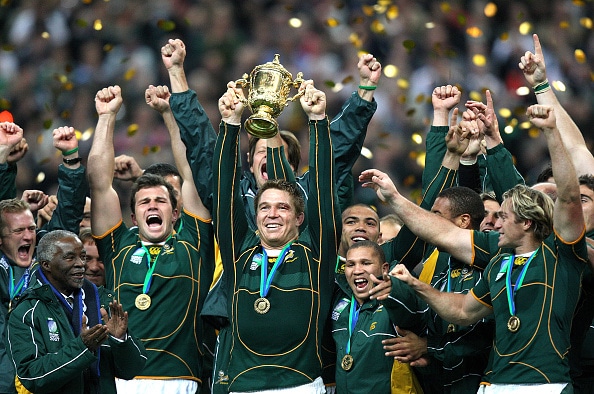The Springboks’ second World Cup win was four years in the making, writes JON CARDINELLI.
Jake White grabbed an energy drink and placed it on the change room floor. It was November 2005, and the Springboks had just lost 26-20 to France at the Stade de France, the host venue for the 2007 World Cup final. It should have been a moment for reflection. White, however, saw it as an opportunity.
‘Don’t be discouraged,’ the coach told the players, who had huddled around him and the symbolic bottle. ‘Two years from now, we will be back in this change room after the World Cup final. Two years from now, we will put the trophy down on this exact spot.’
John Smit remembers what followed on 20 October 2007.
‘Jake never wavered in his belief that we would win the World Cup,’ says the former Bok captain. ‘Sure enough, after we won the final, he put the trophy down on that same spot.’
Smit cannot discuss the 2007 triumph without talking about the four-year adventure that preceded it. It’s been 10 years since he lifted the Webb Ellis Cup, but the memories of that incredible journey are still fresh.
‘It’s hard to believe it was 10 years ago,’ he says. ‘I was sitting with Victor Matfield, Jean de Villiers and Fourie du Preez at a function recently. We spoke about the fun times we had off the field; the pranks and skits that were put together at the team hotel when we were on tour.
‘I suppose that says it all. We made some special memories and became really tight. I’m talking about all 35 players and the management team. That bond is still there, 10 years later. That’s quite lekker. We wanted to have a reunion this year. Unfortunately, it’s probably not going to be possible with guys scattered at clubs across the world.’
That bond was not forged overnight, though. In 2004, mental coach Henning Gericke worked hard to break down the walls that existed between some of the players.
‘South African men are proud,’ says Smit. ‘They don’t like to share. Henning encouraged us to do so. We made a mental shift over four years. We started to care about one another and that helped us to realise a common goal.’
The Boks won the 2004 Tri-Nations. On the surface, it appeared as if White’s team had turned things around after a disastrous 2003 season that included the infamous Kamp Staaldraad, as well as a World Cup quarter-final exit. Behind close doors, however, Gericke and the management team were still working to get the team dynamics right.
‘Players would congregate according to their provinces,’ recalls Gericke. ‘The Bulls would sit in one corner, the Stormers in the other, and so on. There was no mixing. We knew we would have to change that in order to build a winning culture.
‘Jake had to work hard to win over the Bulls players. We needed everyone pulling in the same direction. John played a key role in bringing everyone together, but Victor was another important piece of the leadership puzzle. Victor was loyal to Bulls coach Heyneke Meyer [who some felt should have got the Bok job ahead of White]. That said, Victor understood that the team needed John and Jake. John knew he would need Victor’s support as a leader if the team was going to come together and play as one.’
Visual-skills coach Sherylle Calder joined the Boks in 2004 after a stint with Clive Woodward’s World Cup-winning England side. She remembers the years between 2005 and 2007 as ‘turbulent’. South Africa lost seven of their 12 Tests in 2006, a record that included five consecutive losses. White barely managed to make it through that season with his job.
‘Jake was called home while we were on tour in November 2006,’ Calder recalls. ‘We got together as a management group. There was a lot of uncertainty about what would happen next. When I look back now, I can see how those challenging times shaped our mindset. “Resilient” is the word I would use to describe that group of coaches and players.’
‘In a sense, it got us into World Cup mode a year early,’ says Smit. ’It was just one setback and challenge after the other. We stuck together, though. When it seemed like everyone was against us, we closed the laager.’
The Boks beat England in the second Test at Twickenham to finish 2006 on a high. Key players such as Du Preez and Schalk Burger returned from serious injuries in 2007, and suddenly there was reason to feel optimistic about the team’s chances at the World Cup.
White continued to search for ways to inspire and motivate his charges. Calder recalls how the coach convinced her to bring her 2003 World Cup winner’s medal to a training session before the squad left for France.
‘Jake wanted to show the players what a World Cup winner’s medal looked like,’ she says. ‘He waited until training had finished and we were all on the bus. He stood up holding my medal and said the group should make a pact. He said we are not coming back to South Africa without these medals.
‘My medal from 2003 was passed around. It was interesting to see how the players treated it. Some turned it upside down. Others bit on it. I think Jake’s plan worked perfectly. There was a great buzz on the bus. It was as if the players had got their hands on the real thing.
‘Later on, just minutes after the World Cup final, the players were given their actual medals. The big joke was that the 2007 World Cup medals looked nothing like the one we had shown them before the tournament, as the design varies from tournament to tournament. They had obviously built up an idea in their mind of what one of these medals should look like.’
Smit reveals that the Boks found the time to enjoy lighter moments during the tournament.
‘There was always a lot of fun to be had when the likes of Jaque Fourie and André Pretorius were around,’ he says. ‘Sometime during the pool phase, Jaque and André executed a prank that they called “Bok Scare Files”.
‘They went down to a bakery near our hotel and bought all the chocolate pancakes they had. They told the props and the hookers – you know, the guys who were unlikely to turn down a free meal – about the pancakes in the team room. These were placed on a table next to a cupboard. Every time one of the players took a pancake, Jaque jumped out of the cupboard and gave them the fright of their lives.
‘This went on for some time. Jaque and André grew in confidence and went after bigger game. André told Juan Smith about the free food, and sure enough, Juan went down to the team room to check it out. Juan didn’t react as expected, though. When Jaque jumped out of the cupboard and shouted “Wah!” Juan greeted him with a punch to the face. Needless to say, that was the end of “Bok Scare Files”!’
The players were given the space to express themselves on and off the field. Meanwhile, the coaching staff and the likes of Smit were tasked with keeping the suffocating pressure at bay that is typically associated with global tournaments.
Du Preez played for three coaches at three World Cups over the course of his Test career. Few are better placed to comment on what has worked for South Africa at recent tournaments, and what has not.
‘I’ve seen how pressure can affect a management team and the players,’ says Du Preez, who led the Boks in the latter stages of the 2015 World Cup. ‘It’s not easy to deal with everything that’s happening, especially the external factors. Jake was fortunate that he had a strong management team to lean on. A guy like Eddie Jones [who had coached Australia at the 2003 tournament] was invaluable. Jake bounced a lot of ideas off him. In terms of the players, John ensured the pressure felt by the coaches and himself was not transferred to the team.’
There was a telling moment at the team hotel in Marseilles where, after watching the All Blacks lose to France on TV, the players and coaches poured into the lobby to chat about what the result could mean for their own title chances. The next day, Fiji were competitive for 60 minutes, before the Boks shut them out and secured their place in the semi-finals.
‘Those 24 hours were huge in the context of the tournament,’ says Jones. ‘From the moment the All Blacks were knocked out to the final whistle of our game against Fiji, there was a special energy surrounding the Bok team. After they beat Fiji you got the feeling that the World Cup was the Boks’ to lose.’
The Boks went into the semi-final with a simple plan.
‘We knew we would have to out-kick Argentina to win the game,’ says Smit. ‘Fourie du Preez was nothing short of majestic with how he controlled the contest. Butch James, one of the unsung heroes of that World Cup, was at the top of his game too.’
Bryan Habana, who went on to score a record-equalling eight tries at the tournament and was later named World Rugby Player of the Year, was just as influential in the semi-final, according to Calder.
‘Our pre-tournament preparation was excellent, and it was great to see the players executing in a match situation week after week,’ she says. ‘We were the most skilful team at that World Cup. The defining moment for me was when Bryan intercepted and scored a try in the semi-final. That’s when I knew we would win the final. I still watch the clip of that play today.’
Gericke maintains that every player played his part in the lead-up to the decider against England. Fringe players like Bob Skinstad, a former Bok captain himself, are remembered for their selflessness and dedication during what must have been a difficult time in their careers.
‘Jake decided to go with Wikus van Heerden ahead of Bob on the bench for the final,’ says Gericke. ‘Bob came to my room to chat about it. He was in tears. All he had ever wanted was to play a part for his country in a World Cup final. I told him he still had an important role to play. I said the 22 selected for the final would need his support now more than ever.
‘It couldn’t have been easy for him, but Bob embraced that role wholeheartedly. He really boosted the guys before that game against England. Obviously he was disappointed to be left out, but he understood there was a bigger team goal. That for me showed what the team was about. There were no egos.’
The Boks suffered a setback on the eve of the tournament when first-choice No 8 Pierre Spies was ruled out due to clots on his lungs. Hooker Bismarck du Plessis was brought in as a replacement, as White felt he had enough back-row cover, and utility forward Danie Rossouw could fill the gap at No 8.
Rossouw emerged as one of the star performers for South Africa at that tournament. Indeed, it was Rossouw who got across to deny Mark Cueto a try in the World Cup final. That match may have panned out differently if Rossouw had not forced the England wing’s foot into touch.
‘It was a great feeling to be first choice,’ says Rossouw, who was so often used as an impact player from the bench over the course of his 15-year career. ‘I built up a lot of confidence in the early stages of the tournament.’
Fortune favoured the Boks when Rossouw survived an injury scare in the pool game against Tonga. After coming off second-best in a sickening collision, he was stretchered off the field.
‘I went for an MRI at the hospital and was thinking, “That’s it, my World Cup is over.” I was devastated. Then it looked like I would be OK. Our doctors and physios did a great job to get me back on the field. I was over the moon. I knew I had to make the second chance count.’
Rossouw chuckles when he is pushed to talk about that tackle on Cueto. You can almost hear him shrugging over the phone.
‘To be honest, I remember the final for a different reason. I was so nervous. Those who know me will tell you I don’t stress before big finals. It was the World Cup final, though, and I couldn’t control the butterflies as I ran on to the field.
‘England had the put-in to the first lineout of the game. Victor did brilliantly to steal the ball. Fourie got it and tried to put me into space, but I dropped the ball cold! Who knows, maybe that helped to get the nerves and the mistakes out of my system.’
From where Smit was standing, the Boks did little wrong over the course of those 80 life-changing minutes.
‘We came up against an England side that had turned things around after we had beaten them 36-0 in the pool phase.
They had moved away from their management. The player-driven approach was working for them. That said, we felt that we had enough to deal with them. We really played within ourselves that day.’
Smit feels the Boks landed the winning blow when Frans Steyn kicked a long-range penalty in the 62nd minute. That penalty goal took the Boks eight points clear of England.
‘I said to Frans, “If you pop this over, we have the game. No pressure.” Frans just laughed. The kid was only 20. He probably had no idea what was at stake. After that, we closed the game out. I still believe we would have beaten any team in the world that day. We were at the top of our game.’
Rossouw will go down in history as one of South Africa’s most decorated players, having won two Currie Cup titles, three Super Rugby titles, two European Cup titles, a French Top 14 title, two Japanese Top League titles, an All Japan Championship and a Tri-Nations title. The man himself still ranks that World Cup triumph in 2007 as his finest moment, though.
‘I’ve had some good wins with the Bulls, but that World Cup victory will always be the highlight,’ he says. ‘The fact I started at that tournament, as opposed to coming off the bench, stands out. I’ll never forget the camaraderie in that team either.’
Shortly after receiving her second World Cup winner’s medal, Calder paid a visit to the losing change room and offered commiserations to some of her former pupils and colleagues. Unsurprisingly, the mood in the England camp was dark.
‘We had been through so much over a four-year period and during the tournament. There was an outpouring of emotion when we knew we had realised our goal,’ she says. ‘I felt for the England players, though. I’ve always known Jonny Wilkinson to be the ultimate competitor. It was Jonny who won the World Cup for England with that drop goal in the 2003 final. It was tough to see him and so many of the others devastated by the result against the Boks.’
Gericke remembers the party that followed when the team returned to South Africa for an open-top bus tour.
‘We drove through New Brighton, a poor area in Port Elizabeth, and the kids chased the bus all the way. We went to Newlands and it was packed to capacity with people who just wanted to say “thank you” to the Boks.
‘The 1995 tournament was unique. Who could forget the moment when President Nelson Mandela handed the trophy to Francois Pienaar? That said, 2007 was special in that it brought the country together again. It was the perfect end to our journey.’
Ten years later, those players and coaches are still recognised as some of the best the game has seen. Smit would like to believe the group won more than a trophy, though.
‘I suppose they can never take that achievement away from you, but I’d like to believe the World Cup won’t define us as people,’ he says. ‘We will always be remembered as the class of 2007, but as I said, the memories we’ve made and the friendships we’ve built are more important than the wins and the trophies. That team built something special.’
Perhaps that’s yet another reason it will never be forgotten.
– This article first appeared in the October 2017 issue of SA Rugby magazine





